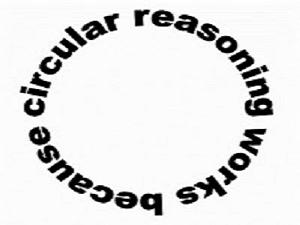5 More Logical Fallacies in Politics
Last year, in order to illuminate how unreasonable the human mind can really be, I made a list of incredibly common logical fallacies we all commit. I used politics to illustrate, and some readers misread my list as some kind of partisan attack, which it was not intended to be. For the most part, though, my original list has gotten plenty of positive feedback, so I decided it was time now to revisit the topic and find a few more common fallacies. Again, I will use current events and modern American politics as examples, but I will endeavor to be moderate. Though I'm sure some readers won't be satisfied unless I spend all my time attacking Republicans or Democrats, I want to stress that the point of this list is not to score political points but to illustrate the fact that politicians and pundits of all types use fallacies on a daily basis. Sometimes they use them unintentionally, sometimes they know they're doing it, but every single time, they should be treated with skepticism and critical thinking, because without those tools, all we will have left is illogical partisan bickering.
THE APPEAL TO TRADITION
 | | It is traditional to compare your politicians to Hitler |
We'll start with an easy one. The appeal to tradition is exactly what it sounds like, an argument that presupposes that the best way to do something is the way it has always been done. This is almost completely untrue and disavows the nature of progress, but it is still a profoundly effective argument. Most of us are programmed to resist change and we like to cling to our traditions, so we tend to agree with people who argue in defense of those traditions, especially as we get older. I stress that this is a generalization and certainly not true of all of us.
President Obama demonstrated this one yesterday in his speech to the governors. While arguing against cutting spending for infrastucture projects, he said, "This hasn't traditionally been a partisan issue. Lincoln laid the rails during the course of a civil war. Eisenhower built the Interstate Highway System. Both parties have always believed that America should have the best of everything. We don't have third-rate airports and third-rate bridges and third-rate highways. That's not who we are. We shouldn't start going down that path." There are a couple of different fallacies here, but the clearest is his appeal to tradition, the idea that just because Lincoln and Eisenhower spent money on infrastucture projects, that's the only way to avoid having "third-rate airports and third-rate bridges and third-rate highways." The president may be right, but that's not the point: it's a bad argument.
Of course, there are certain social conservatives who appeal to tradition as a reflex. Whether it's trying to legally define marriage as a "traditional" union between a man and a woman or telling us that we should honor the pledge of allegiance in schools because they never had a problem with it when they were in school, we've all heard these appeals to tradition. Certainly there are traditions worth preserving, but just because something is a tradition, it doesn't automatically make it a good thing. After all, for a long time, slavery was a tradition.
THE FALSE DICHOTOMY (FALSE DILEMMA)
 | | Here in America, we do both, often at the same time |
Whenever you are given a limited number of options that attempt to force you into thinking inside the box, you have probably been given a false dilemma. The simplest and most common form of this is the false dichotomy, where the argument proposes that you have only two options. This is used in politics for any number of reasons: either the speaker wants you to accept something by arguing that the only available alternative would be much worse, or the speaker simply wants to rally people through an "us vs. them" argument.
This is best exemplified today by the debate over collective bargaining that started two weeks ago in Wisconsin. According to Wisconsin Governor Scott Walker and several other conservative leaders, we are at "a critical crossroads" (note this mental image is one of two roads) in which the government must choose between tackling huge deficits or allowing public labor unions to collectively bargain for benefits. This is clearly a false dichotomy, because it is possible to do both, neither, or a third option. The pro-union side doesn't get a free pass, though, because the arguments coming from that end of the spectrum tend to fall victim to the appeal to motive and the slippery slope fallacy.
Of course, the greatest example of the false dichotomy in American politics is one we see every few years when it comes to election time. Most people believe that we have to vote for either a Republican or a Democrat and those are the only options available to us. As a card-carrying member of a third party, I've hammered this point to death, but it's worth reiterating: the only reason we are in this false dilemma is because we believe in it. But it extends to more than just elections, because a lot of us tend to intuitively believe that if the Democrats are wrong, the Republicans must be right (or visa versa). This is laughable on its face, because both parties can be right and both can be wrong, or as is even more common, an entire party might not be united in its views on any given subject (that's a different fallacy--a "hasty generalization"--to be covered in a future list).
THE FALSE ANALOGY
 | | Japan: indistinguishable from Islam |
Humans think in metaphor, which is why arguments that use them are usually the most effective. We have to be careful to remember, however, that there is no such thing as a perfect metaphor. This is where the false analogy comes in, because strictly speaking, all analogies are false. Still, some analogies are better than others, and particularly terrible ones should be called out as fallacious. An analogy rises to this level when it is used to reach a conclusion about two things based upon their commonalities. In logic speak, somebody argues that X and Y are similar because they both contain A and B, but then adds that, because X contains C, Y must also contain C. This fallacy can also be turned on its head by somebody who argues that, because the two things being compared have one thing that is different, the analogy must be completely false (because X contains A and B and because Y does not contain B, Y cannot contain A). This is also fallacious, for pretty much the same reasons. I know it's a little tricky and confusing, so let's get to the examples.
A few months ago, when the proposed "Ground Zero Mosque" was in the news, columnist Charles Krauthammer penned an explanation as to why he and many on the right were opposed to it. He wrote that "while no one objects to Japanese cultural centers, the idea of putting one up at Pearl Harbor would be offensive." This is a false analogy for any number of reasons, but let's dissect it. First of all, we need to isolate the core analogy. While there are several metaphors that can be culled from his statement, what it boils down to is that a proposed Japanese cultural center at Pearl Harbor is analygous to the proposed Islamic cultural center at Ground Zero. Pearl Harbor and Ground Zero do indeed share some commonalities: America was attacked there by a foreign power, the attack lead to large-scale military conflict, a horrific number of American lives were lost, etc. However, the attack on Pearl Harbor came from all of Japan whereas the 9/11 attack was not carried out by all of Islam (not even close), which is where the analogy becomes fallacious. The relationship between Japan and Pearl Harbor is not the same as the relationship between Islam and Ground Zero. (For those trying to figure out what "C" is, it's the objection people should make to the proposed cultural centers; Krauthammer is arguing that, because the Japanese one should elicit objections, the Islamic one should as well.)
This kind of thing is pretty common in politics, whether it's by people comparing government to business, the people to sheep, or pundits to giant blustering bags of hot air (hard to find the fallacy in that one, actually). Still, the most frequent usages of the false analogy involve history, as in the above example. Politicians and political thinkers love to compare current events to past ones, and people are usually so dazed by the similarities that they forget to double-check the significance of the differences. There is no formal "appeal to history" fallacy that I know of, but it's one you should definitely be aware of when listening to political argument.
THE FALSE PREMISE
 | | That's just absurd; we all know there's no shellfish in Hell |
Similar to the false analogy (and sometimes hard to distinguish from it) is the false premise, where a valid argument is made using faulty information. Technically, this is not a fallacy at all, because the logic of an argument that uses a false premise can actually be perfectly sound. Still, I list it here (and it is found on several lists of logical fallacies) because it is a deceptive form of argument that comes up pretty often. A false premise is usually found in the simplest of conclusions. For example, take the classic "transitive" argument (if A equals B and B equals C, then A equals C), which is rock solid, logically speaking. However, if it turns out that A does not, in fact, equal B, then the argument is flawed by a false premise. In effect, this becomes a question of fact, not logic.
I don't want to spend too much time here talking about the new healthcare law, since I spent much of the last list discussing it, but I will bring it up one last time in regards to statements the president made yesterday during his speech to the governors. When he started discussing the new law, his argument was that, because the governors want to reduce deficits and because the healthcare law will reduce deficits, the governors should be in favor of the new healthcare law. This is a perfectly logical argument. However, there is a possibility that the new healthcare law will not reduce deficits, as well as a possibility that the governors might not be interested in reducing deficits to begin with. If it turns out that either of these is the case--and only time can really tell--then President Obama's argument is predicated upon a false premise.
That's a simple example. Often, the false premise is much harder to discern, because it usually isn't presented as part of the argument. The "unstated major premise" is sometimes considered part of a logical fallacy that I'll get to in a moment, but sufficed to say, many arguments are made that assume something to be true even though it might actually be false. For example, there's the argument that we should ban smoking in all public places in order to improve overall health, which has a few unstated major premises: (1) smoking is bad for your health (true); (2) banning smoking in all public places will reduce smoking (dubious); (3) banning smoking in all public places will reduce exposure to second-hand smoke (true); (4) second-hand smoke is bad for your health (dubious).
BEGGING THE QUESTION
 | | The irony is that it's true |
The term "begging the question" is one of the most abused terms in the English language and should usually be replaced with "raising the question." Contrary to what you probably think it means, begging the question is actually the name of a logical fallacy. It is sometimes also refered to as a circular argument or a tautology, though there are subtle differences between all three things. An argument "begs the question" when the premises, either stated or unstated, include the argument to be proved. For example, one might argue that God exists because the Bible says so and the Bible is the ultimate authority because it is the word of God.
Sometimes begging the question can be laughably simple, as in the argument, "stealing is illegal because it's against the law." However, arguments that beg the question are sometimes so subtle or complex that they're hard to notice. For example, it is begging the question to assert the following (stolen from a very old book by Richard Whately): "To allow every man an unbounded freedom of speech must always be, on the whole, advantageous to the State, for it is highly conducive to the interests of the community that each individual should enjoy a liberty perfectly unlimited of expressing his sentiments."
Another type of this fallacy is the unstated major premise, mentioned above. For example, if someone argues that we have to keep drugs illegal in order to prevent rampant drug abuse, the unstated major premise (which is found in the DNA of the argument itself, hence it's begging the question) is that legal drugs are abused less than illegal ones. An even better example is the argument that abortion is morally wrong because murder is morally wrong. The unstated major premise is that abortion is the same as murder.
Before I finish, I'd like to disclaim that I am not immune from logical fallacies in my own writings and arguments. While I encourage my readers to point them out to me if they can find them, you are not allowed to act smug about it, because you, whoever you are, are not immune from them either. We all make logical fallacies, and we all fall for them. What's important is that we stay vigilant against them, assuming we are interested in debating in good faith and looking for the untarnished truth. Don't worry, there are plenty of logical fallacies I haven't addressed yet, and there's not much of a chance that they'll stop showing up in politics. What I'm trying to say is that you'll see another one of these lists in the near future. See you then!
-e. magill 3/1/2011
|
|